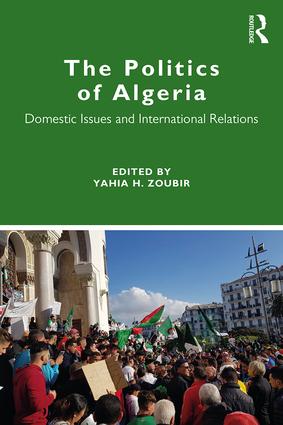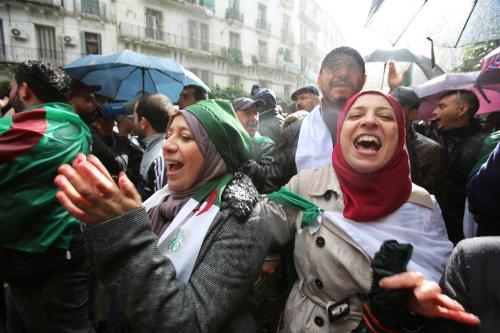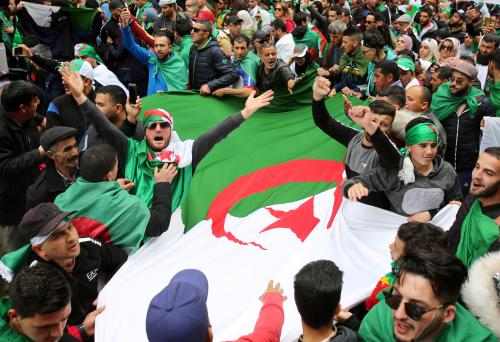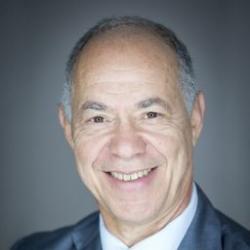Content from the Brookings Doha Center is now archived. In September 2021, after 14 years of impactful partnership, Brookings and the Brookings Doha Center announced that they were ending their affiliation. The Brookings Doha Center is now the Middle East Council on Global Affairs, a separate public policy institution based in Qatar.
Algeria’s political crisis, which began when President Abdelaziz Bouteflika’s cronies announced on February 10, 2019 that he would run for a fifth term in office, has entered its 48th week. Millions of Algerians still march throughout the country every Friday to demand the dismantlement of the regime and the establishment of a genuine civilian democratic system, a movement that began on February 22, 2019. While the military forcibly removed Bouteflika on April 2, the peaceful protest movement — hirak — is not content with the half-measures or cosmetic reforms that the authorities offer. Instead, the government must address the demands that the hirak has put forth and initiate genuine change, rather than use subterfuges to maintain the present system.
How we got here
The last 20 years of Bouteflika’s authoritarian, neopatrimonial, and corrupt rule — and the nature of the political system in place since independence in 1962 — have resulted in a real rupture of the social contract. Rulers have lost their legitimacy and the Algerian people resist being ruled under the old system.
Faced with a strenuous protest movement last year, the Bouteflika government initiated a roadmap before his April 2 ouster. The powerful vice-minister and head of the chiefs of staff, Ahmed Gaïd Salah (AGS), sought to implement that plan. His objective was to appoint a president loyal to him to provide a civilian façade for the military to maintain the same system. While the hirak succeeded in forcing the regime to cancel the two planned elections in April and July, AGS was able to impose a new date, December 12, without consideration for the wish of the people. Millions of Algerians at home and abroad objected to the December 12 election, and voter participation for that election was the lowest in Algeria’s history. (An official announcement claimed that 41% of eligible voters participated, but the best estimates ranged between 10% and 15%.) As the German newspaper Die Zeit put it, the Algerian regime should receive the Nobel Prize for electoral fraud. Former prime minister Abdelmadjid Tebboune (one of the five candidates, all part of the old regime) allegedly won 58% of the votes, and is now president. Tebboune was AGS’choice; the race between 5 candidates was mere diversion.
The election did little to ease the protesters’ demands. Quite the contrary: A march a few days ago, on January 10, 2020, demonstrated that the hirak — which has remained remarkably peaceful — has not lost momentum. Protesters are not ready to abandon their essential demands. A week before the march, the government freed 76 detainees, imprisoned under AGS’s iron-fist authority before his sudden death on December 23. The same day the prisoners were released, a new government headed by Prime Minister Abdelaziz Djerad was formed.
The new government falls short
The government expected this process to appease the hirak, but to no avail. With very few exceptions, most of the new appointees (ministers, minister delegate, and state secretaries) had served under Bouteflika’s rule in different governmental functions; about one-third of the ministers in the new government (11 out of 28) had served as ministers in Bouteflika’s government. And although interim Head of the Joint-Chiefs of Staff Saïd Chengriha, a more low-key and liberal figure who abstained from becoming vice minister of defense, is painstakingly detaching the Algerian People’s National Army (ANP) from politics, the same political system remains. Tebboune is now minister of defense (the first time a civilian has occupied this position) and supreme leader of the armed forces, but that does not prove that he holds real power. The ANP does not want to give the appearance of being directly involved in politics (as it was under AGS) by having a member of its ranks serve as vice minister of defense. It made that decision in the wake of the country’s severe crisis and within its own ranks — with AGS imprisoning commanders, senior intelligence officers, and close to 30 former ministers and prime ministers, and generals on the run overseas — in order to preserve unity. The ANP now wishes to avoid giving the impression of being directly confrontational with the hirak.
And so, President Tebboune missed a great opportunity to engender trust between state and society and initiate a genuine transition toward a democratic political order. Unsurprisingly, the protesters have again rejected dialogue with what they see as an illegitimate president and illegitimate government. They demand civilian rule and the elimination of corrupt officials. Algerians want genuine independence from oppression, authoritarian rule, neopatrimonialism, clientelism, nepotism, and corrupt rule. They want a “new republic.”
For the protesters, coopting a few technocrats in the government is of little significance and demonstrates that Tebboune has no intention of changing the system. The popular movement perceives every move by the government as an attempt to maintain the very system the protesters want disassembled, and the regime has previously resorted to cosmetic changes (e.g. after the bloody riots of 1988, when the government changed the constitution and allowed a multiparty system) as a strategy to save and rejuvenate the system after a major crisis.
The bottom line is that the new authorities have made few concessions to the hirak. Freeing some political detainees does not represent a real gesture, since those political detainees had been imprisoned unjustly; besides, the remaining prisoners, some of whom really represent the hirak, are still in jail.
The government says it wants dialogue (the hirak is aware that that’s an attempt to divide the movement), but under the current circumstances, dialogue serves no purpose beyond providing the government with some of the legitimacy it lacks. The crisis is not merely political. The economy has suffered a great deal since the collapse of oil prices in 2014; the rentier state never diversified the economy. The current crisis has discouraged foreign direct investments. The new government has yet to appoint a minister of the economy, probably because no prominent economist (e.g., Ahmed Benbitour, who refused to join) wishes to join a discredited regime. Beyond the economy, a continuation of the crisis represents a security risk: The military risks losing its high standing among the population at a time when Algeria faces major threats along its borders, namely in Libya and the Sahel.
A call for mutual respect
How can Algeria overcome the crisis? The inescapable way out remains a genuine democratic transition through a constituent assembly or any other agreed-upon transitional mechanism. This means dissolving the current parliament and eventually replacing it with authentic, democratically-elected representatives, as well as forming a democratically-appointed independent electoral commission and setting firm presidential term limits. Building the rule of law, good governance, and strong institutions in Algeria requires working together with the hirak’s eventual representatives.
Before such a process, the authorities must free all political prisoners to create trustworthy conditions for negotiations. A negotiated pact between the state and the opposition is possible. But this requires that corrupt personnel not be party to such a process; instead, the state does have patriotic personnel who should be part of the transition. Popular legitimacy must be the foundation of the new system, while justice should be independent (not dependent on phone calls from officials to render judgment). A compromise between independent political parties and social forces, the presidency, and the hirak is obviously necessary.
If the new president wishes to succeed in establishing trust, he must demonstrate genuine willingness to listen to the demands of the hirak and other relevant social and political groups, and not start negotiations with pre-established proposals. Tebboune’s decision on January 8 to amend the constitution is a small step forward, provided it fulfills some conditions. He set some objectives for the committee in charge to focus on the “moralization of public life and the fight against corruption,” “consolidation of the separation and balance of powers,” “strengthening of Parliament’s power of oversight,” “consolidating the independence of the judiciary,” “consolidating the equality of citizens before the law,” and “constitutional entrenchment of the mechanisms for organizing elections.” These are essential objectives, but unfortunately Algerian constitutions have set similar ones in the past without their ever being implemented. In 2014, Bouteflika retained only one of 32 constitutional proposals that the same consultant in constitutional law had made. This revision cannot be merely a technical enterprise by academics, but must constitute a political project that considers the nature of the state and the military, as well as socioeconomic, geo-strategic, educational, and cultural considerations.
What safeguards will the state institute to prevent another president from tailoring the constitution to his own predilection, as Bouteflika did in 2008 and 2016? The constitution must make it impossible to extend term limits. Is there any guarantee that the revised constitution would ensure the balance of power within the state? Tebboune cannot simply submit a preestablished proposal; he must recognize the parameters of the popular movement, as well as the old political class. The time of patriarchal decisions is gone. Besides the constitution, the authorities must revise other laws (on elections, information and the media, political parties, etc.). There is reason to be mistrustful because the regime pursues the same practices and employs the same old personnel who are now responsible for producing a revised constitution. Tebboune needs also to allow media independence and encourage unfettered political debates, and must put a stop to the repression of the hirak during the protests.
But most importantly, the government must declare its genuine readiness to negotiate. For its part, the hirak and other political forces must accept pluralism, enunciate a strategy, develop a vision for the future, and submit concrete proposals (even if some individuals have already done so in isolation). For Algeria to have hope of progress, all parties to talks must agree not to automatically reject the other.






Commentary
Can Algeria overcome its long-lasting political crisis?
January 15, 2020